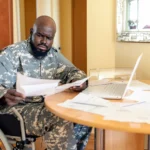Disability compensation from the VA can alleviate the financial cost and acknowledge the emotional toll of service-connected traumatic brain injuries.
Summary
- Veterans must prove their traumatic brain injury (TBI) occurred due to an in-service event involving an external force and demonstrate one of five VA-approved acute symptoms to qualify for disability compensation.
- Proving a service connection for a TBI may require medical evidence, witness statements, and other records.
- The VA presumes a connection for certain secondary conditions of traumatic brain injuries like Parkinson’s Disease and depression.
- Veterans with service-related TBIs may qualify for Total Disability Individual Unemployability (TDIU), Special Monthly Compensation, or Aid and Attendance benefits.
- VetLaw specializes in helping veterans secure disability compensation for TBIs, leveraging their knowledge of the VA appeals system and offering free consultations to guide veterans through the claims process.
Traumatic brain injuries (TBIs) have the potential to devastate a veteran’s ability to communicate, regulate emotions, maintain memories, or function independently. Disability compensation for traumatic brain injuries is available to qualified veterans.
At VetLaw, our veterans benefits denial attorneys possess the skills, resources, and knowledge of the VA appeals system that is invaluable to veterans seeking disability compensation for traumatic brain injuries. You can trust that we will put you first throughout the VA disability claim appeals process.
Take advantage of a free consultation with us and learn how we can help you secure VA disability benefits. You can reach us at (855) 573-1503 or submit a contact form today to schedule a time to meet with our team about your VA traumatic brain injury claim.
The VA’s Definition of Service-Connected Traumatic Brain Injuries
Not every in-service head injury qualifies as a traumatic brain injury under the VA’s criteria. Generally speaking, to be eligible for VA disability compensation for traumatic brain injuries, veterans must show that their TBI was caused by an event while they were on active duty.
Under the more narrow VA definition for service-related TBIs, the VA specifically requires that the in-service TBI event was the result of an external force, such as hitting your head on the ground after falling off a ladder or being struck by debris in a collapsing structure.
Additionally, the veteran has to demonstrate that they experienced at least one of the five VA-approved “identifiable acute manifestations” of brain trauma in the immediate aftermath of the in-service incident. The VA requires at least one of the following symptoms to show that the veteran’s head injury was sufficiently severe:
- Reduced or lost consciousness
- Unable to remember what happened right before the incident or memory loss immediately after the TBI event
- Appearing confused, having difficulty processing or concentrating
- Neurological deficits, such as having trouble speaking
- Brain lesion
The long-term prognosis of a traumatic brain injury can vary widely based on what part of the brain was damaged, the extent of the injury, and how quickly the veteran received treatment.
Establishing the Relationship Between Your TBI and an In-Service Event
If you suffered an in-service traumatic brain injury, you may not be able to provide a full, detailed account yourself. However, the VA still needs to see that your military service caused or aggravated your traumatic brain injury.
This is when having medical evidence, supporting statements from fellow service members who witnessed your behavior immediately after the event, and other forms of documentation is essential to proving a service connection in a veteran’s disability claim.
In recognition of the impact a TBI can have on a veteran’s health, the VA also presumes a service connection for specific secondary conditions, such as depression. Vets with these VA-approved traumatic brain injury secondary conditions can typically secure disability compensation by presenting proof of a diagnosis and corroborating service records.
Types of Compensation You Can Get for a Service-Related Traumatic Brain Injury
Catastrophic injuries like TBIs often have consequences for a veteran’s employment opportunities and daily independence. Disability compensation for traumatic brain injuries provides a monthly payment commensurate with their VA disability rating.
However, veterans with severe traumatic brain injuries may need an additional level of financial support beyond the standard amount of VA disability compensation to balance out the costs of their service-connected condition.
Veterans with service-related TBIs may qualify for one or more types of compensation, such as:
Total Disability Individual Unemployability (TDIU): The VA awards TDIU benefits to veterans who can’t maintain gainful employment due to service-related disabilities like TBIs. TDIU benefits are equivalent to 100% VA disability, but veterans do not need a 100% rating to access them.
Special Monthly Compensation: Veterans with specific combinations of service-related disabilities can qualify for this extra financial benefit.
Aid and Assistance: Veterans who require regular or full-time support with daily tasks, such as bathing, can qualify for Aid and Attendance benefits from the VA. This is another form of Special Monthly Compensation.
Additionally, veterans with service-connected traumatic brain injuries may seek services from the VA provided by the new NDAA amendments. A VetLaw veterans disability appeals attorney can lend their expertise to your VA TBI claim for compensation.
Choose VetLaw to Advocate for Your VA Traumatic Brain Injury Disability Compensation
Following an in-service traumatic brain injury, the subsequent deficits, as well as any secondary physical and mental conditions, can take a toll on veterans and their families. Deciding to pursue VA disability benefits after a claim denial can seem like a futile and stressful option, but you don’t have to handle it alone.
VetLaw is here to help you. With nearly a decade of experience serving veterans with service-related disabilities, VetLaw is a leading advocate for vets across the country.
Give us a call at (855) 573-1503 or submit a contact form today to schedule a free consultation. Our team of veterans disability appeals lawyers will explain your rights, options, and how we can support you in this process.
Frequently Asked Questions
Can I get disability compensation for a non-combat related traumatic brain injury?
Yes, veterans with service-connected traumatic brain injuries can still qualify for VA disability benefits even if they did not sustain their TBI in a combat role. The VA offers benefits to veterans with disabilities linked to their active duty service in non-combat claims.
Do I have to have lost consciousness for my traumatic brain injury to qualify for VA disability benefits?
No, the VA does not require veterans to prove they experienced reduced or lost consciousness for their in-service traumatic brain injury to meet the standards for disability compensation. Veterans can still experience devastating and debilitating complications from a traumatic brain injury without losing consciousness.
Is there a link between brain cancer and traumatic brain injuries in veterans?
Researchers have observed higher brain cancer rates in TBI survivors in the veteran population. Specifically, their data shows that moderate and severe traumatic brain injuries can increase veterans’ risk of developing brain cancer.







